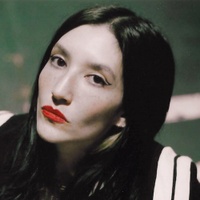On spending time with yourself
Prelude
Thanya Iyer is an enigmatic songwriter who crafts sparkling experimental pop music. Her live band with Pompey, Emilie Kahn, and Daniel Gélinas wields acoustic and electronic instruments to flesh out these serene, spiritual compositions. Thanya and the band’s arrangements empower listeners to embrace mindfulness, aesthetic beauty, and the interconnectedness of all things. After their 2020 Polaris long-listed, sophomore visual album KIND, they released their EP, rest, in the summer of 2022 on Topshelf Records.
Conversation
On spending time with yourself
Musician Thanya Iyer discusses healing through songwriting, the role of a music therapist, and playing in bands with friends.
As told to Lauren Spear, 1290 words.
Tags: Music, Mental health, Process, Adversity, Health.
What can you share about the new music you’ve been working on?
It is a continuation of my most recent album, KIND. KIND was about self-love, whereas this next album is about how healing happens in communities. It is about navigating the dissonance of the world and collective care.
During the pandemic, I wrote a song daily as a (rigid) coping mechanism. It came in many parts as I tried to stay grounded and connected in a chaotic world. What I’m realizing through therapy is that I have been so cut off from my body. When hard things happen, such as losing people, I try to accept it and move on. After my dad passed away in high school, I went to school and wanted to push myself forward. Years later, I started developing chronic pain, and that impacted my mobility. I saw many physios and osteopaths, but the pain I was feeling had an emotional layer that I later came to discover. I realized that the pace of our world is made to disconnect you from your body. The music I am working on is trying to put that feeling into words.
In some of these songs, it sounds like you’re conversing with yourself. Does that resonate?
Yeah, that’s exactly right. It’s a process of trying to grasp what I feel disconnected from and what I’m learning throughout life. Songwriting has always been a place of total presence. When I’m in the flow and not worried about what notes I should play or what I should say, it feels like I’m figuring something out. I’m just spending time with myself.
My favorite part of songwriting is how it can pull things out of you that you didn’t know existed. Can you talk about how you use this in your music therapy work?
Songwriting helps you organize your mind, which can be therapeutic in a music therapy context. When I’m writing a song with someone, so many things come out through free writing that you don’t even realize it’s happening. Just being able to fuel something into something creative is special. I see people gain agency and empowerment through the process because they are making something that is theirs.
Going back to the EP I put out, I called it rest but I didn’t know anything about rest. What I knew more about was burnout, but “rest” was what I was striving for. I think I use music to figure out something about myself. You can write where you want to be and use it as a guide.
In your music therapy sessions, what does it look like when you sit down with someone?
Sometimes, it’s group work; sometimes, it’s one-on-one. I’ve worked with kids, adults, and seniors. Last summer, I was in a group doing songwriting and production, and we wrote together. Everyone’s in a different place in a group, so your role as the therapist is to advocate for everyone and their ideas and help the group work together. It’s a balance. You might make musical goals, but they’re also therapeutic goals in my role. Sometimes, someone could be improvising, and something comes up for them that we can verbally process. Or vice versa, they could be talking about an issue, and improvisation helps them experience it on a deeper level. There are so many musical ways to process something.
You’ve talked about how learning a cover of a song can be a great tool in therapy. Can you discuss this?
Sometimes, you find a song that says the words you’ve been looking for. There is power in making it your own. If a young person is trying to learn something, I love seeing the pride of singing a song that resonates with them.
Another thing I love doing with people is recording. I love seeing how people want their voices to sound or what effects they choose to use. We’ll be like, “How do we use this gear? What’s an XLR cable? What does this plugin do?” Because a therapist’s role can be temporary in some situations, leaving them with something tangible is important. I try to give them the tools so they can keep working themselves.
You are such a massive part of the Montreal music community. I see you at every venue, supporting others or playing in a million different bands. The fact that your new album is about the community makes a lot of sense to me! I want to know about your relationships with your bandmates because, from the outside, it looks familial.
It started with the Indian community. When I was young, my friends would meet at events centred around music and art and sing and dance together. When I navigate the music industry, I ask my friends. That’s what happens with the bands that I play in now. We’re helping each other grow and achieve each other’s vision.
I’ve heard you talk about how improv is essential to your musical process. You said songs can change on tour as you play them.
I’ve always felt improv is a beautiful expression of our bodies and our feelings. I’ve always been drawn to how things can change depending on your emotional state. It does change when we perform because we feel different every night. It’s exciting and freshens stuff for me. I remember a whole tour where I never wrote a set list, and we were like, “Okay, hopefully the songs will come.”
When is this next album coming out?
It’s almost done; I am waiting for the final masters!
Did you make the record in Montreal?
We made it at the PHI Residency just an hour outside of Montreal. It’s incredible. There is a pool, sauna, pool house, beautiful studio, and walking trails. Our friend, who is a farmer, brought all of her vegetables and cooked all these fantastic meals.
Can the recording environment change the music?
Totally. The PHI has a live room downstairs, and the listening room is upstairs, so we recorded all of our stuff in this big room. After this recording session, I realized the album wasn’t done, so we recorded strings, choir, and winds in a separate church. We also overdubbed things in my apartment and made arrangements and mixes all together. It was really fun and collaborative, but at the end of the day, the perfect recording environment for me is doing it together in one room, just vibing and listening.
It’s a special moment you’re in, where the album is completed but has not yet been released. This seems like a crucial period where the music belongs solely to you and your bandmates. Could you share the intention behind this album and what you envision for it upon its release? What are your hopes for it?
Yeah, it’s an excellent question, and I haven’t thought about that much. It was so healing for me to write it. With KIND, we couldn’t tour because of the pandemic. So when we finally got to, meeting people who discovered that album and talking about what song helped them was cool. I hope it’ll make people come together and connect with themselves and with the world.
I think that’s a beautiful thing to say.
Yeah, let it unfold, you know?
Thanya Iyer recommends:
Summer days where you don’t know what time it is, you’re outside all day and you run into friends and new adventures and you’re at peace
Mangos
Colorful things
Water circuit + swim + water circuit
You have an idea, you tell your friends, you make it happen together, you help each other achieve your dreams
- Name
- Thanya Iyer
- Vocation
- musician, music therapist
Some Things
Pagination



